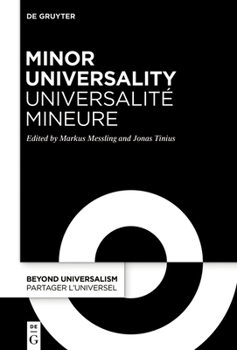Minor Universality / Universalité Mineure: Rethinking Humanity After Western Universalism / Penser l'Humanité Après l'Universalisme Occidental
The circulation and entanglements of human beings, data, and goods have not necessarily and by themselves generated a universalising consciousness. The "global" and the "universal", in other words, are not the same. The idea of a world-society remains highly contested. Our times are marked by the fragmentation of a double relativistic character: the inevitable critique of Western universalism on the one hand, and resurgent identitarian and neo-nationalistic claims to identity on the other. Sources of an argumentation for a strong universalism brought forward by Western traditions such as Christianity, Marxism, and Liberalism have largely lost their legitimation. All the while, manifold and situated narratives of a common world that re-address the universal are under way of being produced and gain significance. This volume tracks the development and relevance of such cultural and social practices that posit forms of what we call minor universality. It asks: Where and how do contemporary practices open up concrete settings so as to create experiences, reflections and agencies of a shared humanity?
With contributions by Isaac Bazi , Anil Bhatti, Jean-Luc Chappey, Elsie Cohen, Leyla Dakhli, Souleymane Bachir Diagne, Nicole Fischer, Albert Gouaffo, Stefan Helgesson, Fatma Hotait, Christopher M. Hutton, Ananya Jahanara Kabir, Mario Laarmann, Rukmini Bhaya Nair, Olivier Remaud, Gis le Sapiro, B n dicte Savoy, Maria-Anna Schiffers, Laurens Schlicht, Sergio Ugalde Quintana, H l ne Thierard, Khadija von Zinnenburg Carroll.





